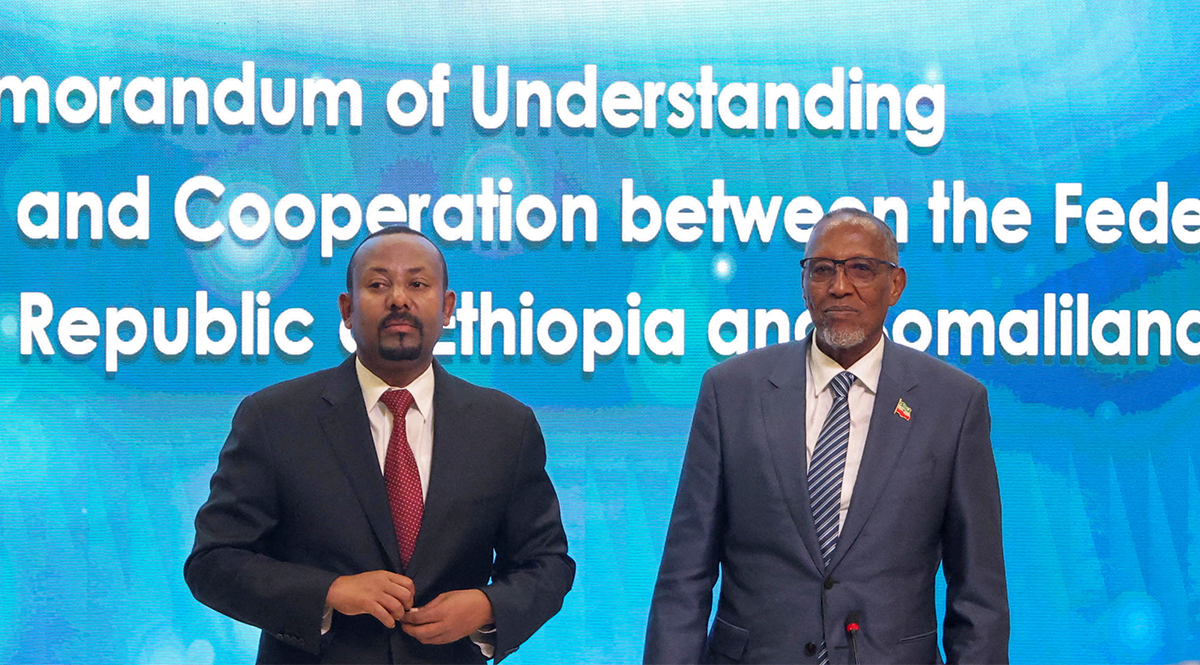Türkiye to Guard the Coast of Somalia
Türkiye and Somalia have concluded a defence agreement under which Türkiye will protect Somali territorial waters for 10 years and help build a navy. The agreement is in response to Ethiopia’s plans to establish a naval bridgehead in Somaliland, internationally recognised as Somali territory outside the control of the authorities in Mogadishu. The agreement is part of broader regional competition around the Horn of Africa involving the United Arab Emirates and Iran.
 FEISAL OMAR / Reuters / Forum
FEISAL OMAR / Reuters / Forum
In February, the leaders of Somalia and Türkiye agreed on the terms of a 10-year defence cooperation agreement. It includes Türkiye’s involvement with Somalia in fighting terrorism, piracy, and external threats, combating illegal fishing, coastal protection, and the development of Somali naval forces. Although the details of it have not been made public, the agreement is expected to increase Türkiye’s military footprint and importance in the Horn of Africa.
Special Turkish-Somali Relations
The essence of Türkiye’s initiation of broad cooperation with Somalia in 2011 was an attempt to test its idea of a “moral foreign policy”, a concept of the then Minister of Foreign Affairs Ahmed Davutoglu, according to whom humanitarian and development activities are also—apart from military, political, and economic ones—tools for building the state’s power. Western countries and international organisations (e.g., the UN) considered Somalia to be too dangerous a country to maintain a presence there, with part of the capital, Mogadishu, controlled by extremists from Al-Shabaab (the Al-Qaeda branch in East Africa) and the country suffering from hunger. Nevertheless, in October 2011, then Recep Tayyip Erdoğan, prime minister at the time, visited the country’s capital as the first world leader in two decades. There, he paved the way for the arrival of Turkish doctors, engineers, teachers, entrepreneurs, and aid organisations. A month after the visit, Türkiye—again the first—opened an embassy in the country, and soon afterwards, also a direct Turkish Airlines connection from Istanbul to Mogadishu, where Turkish companies took over the management of the seaport and airport. However, the economic benefits from the Turkish presence in Somalia were disproportionate compared to the costs. Erdoğan used his involvement in Somalia to claim leadership ambitions, including at the UN and the Organisation of the Islamic Cooperation.
Despite subsequent political changes in Türkiye, Somalia remained one of its most important recipients of both soft power and security policy in Africa. In 2017, Türkiye opened a military base in Mogadishu for the training of Somali forces and was also considering locating a spaceport in Somalia. The Turkish Cooperation and Coordination Agency (TİKA) built the best-equipped hospital in the country (named after Erdoğan). In total, Türkiye allocated about $1 billion in aid funds to Somalia, which heralded Türkiye’s transition from an aid recipient to an important donor country. From Somalia’s perspective, Türkiye was the first country to recognise its potential as a partner rather than a source of instability. It also became an important destination for scholarships and offered easier stays for Somali entrepreneurs and elites. Over the past few years, as Türkiye’s economic crisis mounted, its involvement in Somalia has weakened, and the United Arab Emirates (UAE) took over as its primary partner.
Somalia’s Motivations
The Somali authorities want to protect themselves from Ethiopia’s actions, which they consider hostile. The introduction of Turkish forces to protect the coast would prevent Ethiopia, supported by the UAE, from establishing a foothold in Somaliland. Following Ethiopia’s agreement with this territory in January, an Ethiopian navy base was to be established on the coast of the self-proclaimed republic and located in the immediate vicinity of Yemen. This would block the prospects of reintegration with Somalia, which is advocated by, among others, the European Union, Saudi Arabia, Qatar, and Egypt. The agreement with Türkiye was concluded at a time of resurgence of piracy off the coast of Somalia and an offensive by Al-Shabaab, which drove pro-government forces from a number of towns in central Somalia and intensified attacks in Mogadishu. The prospects for effective defence against extremists were deteriorating due to the impending withdrawal of the African Union mission (ATMIS) and the possible departure of Ethiopian forces that had been holding back extremists in parts of Somalia with the consent of the Somali authorities. This threatened to collapse the defence capabilities of the Somali state. Therefore, expanding and deepening military cooperation with Türkiye may, in the long run, give Somalia hope that it will also increase protection against Al-Shabaab, and that Türkiye will fill the emerging security gap. In turn, by counteracting Somali pirates at sea, Somalia, with the support of Türkiye, averts the risk of returning to the image of a failed state.
Türkiye’s Motivations
The return to active policy in Somalia serves to make up for the losses that Türkiye has suffered to its rival UAE. They resulted from the lack of conviction of the Turkish political class—except for Erdoğan himself—about the justification for large expenditures in Somalia given the difficulties in Türkiye. After winning the election in 2023, the Turkish president could return to the competition for primacy in Somalia, and the growing sense of threat in that country gave him the opportunity to present a new offer. It de facto invalidated last year’s Somalia-UAE military agreement (not yet implemented), which was criticised in Somalia as weakening its sovereignty. The context of the destabilising policies of the UAE and Iran, as well as the international legal arguments in favour of Somalia, allow Türkiye and Qatar, which supports the deal, to present themselves as guardians of the recognised international order. Additionally, in connection with the defence agreement, in March this year Türkiye obtained consent to extract crude oil and natural gas in Somalia from previously unexploited offshore deposits (about 30 billion barrels of oil). Access to this reserve should allow for the reimbursement of part of the expenditure incurred to support Somalia.
Deepening cooperation with Somalia helps to strengthen the attractiveness of the Turkish offer throughout Africa, which Türkiye presents as based on mutual respect and unencumbered by colonial baggage. Since the beginning of the 21st century, it has increased the number of embassies on the continent from 12 to 44. Türkiye is also developing economic relations with Africa, with the value of its trade turnover increasing from $5.4 billion in 2003 to more than $28 billion in 2021. In recent years, the importance of arms cooperation also has been growing: Turkish combat drones have been purchased by, among others, Ethiopia, Chad, Togo, and Nigeria.
Conclusions and Perspectives
The agreement is beneficial to both parties. From the perspective of the Somali authorities, it may contribute to strengthening the country’s defence capabilities in the face of the threat of terrorism and will also help prevent possible actions by Ethiopia that violate its territorial integrity. For Türkiye, the agreement provides an opportunity to obtain some profits from gas and oil extraction, which, in the face of the ongoing economic crisis and growing energy dependence on Russia, will compensate for the financial outlays allocated to support the Somali authorities. Due to the Yemeni Houthi attacks on merchant ships in the Red Sea, the importance of the military presence in the Horn of Africa is growing. By strengthening relations with Somalia, Türkiye will consolidate its current political and economic influence in the country and also strengthen its position in the Horn of Africa at the expense of other entities involved in the region, especially the UAE but also, for example, Iran. The UAE will try to counter the Turkish initiative, and the rivalry between these two countries will intensify. The 10-year framework of the agreement allows Türkiye to permanently anchor itself in the security architecture of Somalia and the Horn of Africa and will legitimise Türkiye's participation in international efforts to counter piracy and promote the security of commercial shipping. For the EU, this is a better prospect than the uncontrolled growth of the influence of the UAE, which is pursuing an increasingly destabilising foreign policy, which, for example, supports militias accused of genocide in Sudan or helps Russia to profit from gold mining in Africa.
The visibility and, therefore, the attractiveness of the products of the Turkish arms industry in Africa will also increase. Türkiye will use the agreement to position itself as a stabilising power, and therefore a necessary one, for example, in relations with the EU, which is developing plans to patrol sea routes in the Red Sea. Türkiye also will want to use this rising status to increase its participation in resolving the Israeli-Palestinian conflict.




.jpg)

